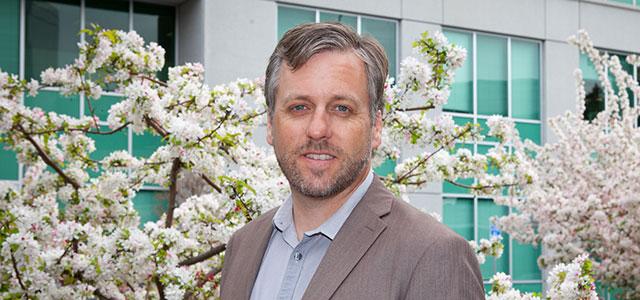
Andrew Penn, MS, RN, NP (photo by Elisabeth Fall)
What Volunteer Clinical Faculty Do: Andrew Penn and Psychiatric Nursing
Volunteer clinical faculty and preceptors offer students individual perspectives and hands-on experience in a variety of health care settings and specialties. The cumulative effect of what these volunteers impart plays a significant role in the care any health system delivers. This series aims to shed light on the unique roles these valuable mentors play.
This month we hear from Andrew Penn, psychiatric nurse practitioner at Kaiser Permanente Redwood City and assistant clinical professor at UCSF School of Nursing.
I’ve been working in mental health in some capacity for over 20 years. After graduating with a bachelor’s degree in psychology from University of California, Santa Cruz, I thought maybe I’d be a psychologist. Right after college I started working in a children’s mental health agency, with emotionally disturbed kids in a residential treatment facility. I had a real passion for the work, but I quickly learned that it’s kind of hard to make a living with a BA in psychology. A lot of mental health care opportunities that you find early in your career, before you have graduate training, offer limited opportunity for growth and mobility. My path to nursing was really revealed to me after I started working at San Francisco General Hospital, running rehabilitation activities for severely mentally ill adults.
I remember meeting a few nurse practitioners at SF General, and I thought they were fantastic. Their competence, professionalism and savvy made me think: “How can I be like that?” So I asked. That’s when I heard about the UCSF Master’s Entry Program in Nursing (MEPN) for psychiatric and mental health nursing. It sounded like the training I was looking for, so I entered the program in 2002, received my RN in 2003 and, a couple of years later, received my nurse practitioner and clinical nurse specialist licenses. I have board certifications as an adult nurse practitioner and a psychiatric/mental health nurse practitioner. When I teach at UCSF, I like to say that you know I’m a UCSF graduate because I have more letters after my name than in it.
I began working at Kaiser San Francisco as a staff nurse on a medical/surgical floor and made the transition to the outpatient psychiatry clinic at Kaiser Redwood City seven years ago. Today I see patients primarily for psychiatric evaluations and to begin and monitor psychotropic medications, but I also do a lot of psychotherapy in the context of that role. My youngest patient is 17 and my oldest is 91. I see whoever comes through my door, so their conditions range from the simple to the complex and span all psychiatric diagnoses. I have a very collegial relationship with the therapists and psychiatrists here at the clinic. We’re all very busy – at last count, I had somewhere around 900 patients – but there is always time to collaborate and consult, which helps to make a challenging job engaging and interesting.
My initial desire to become clinical faculty stemmed from my own experience with nurse mentors from UCSF. Our profession is so much about apprenticeship; that’s how you learn the things that make you an effective clinician. I was deeply appreciative of and impressed with my mentors. It was so important that they gave their time to train me. I wanted to be one of those people. I wanted to do that for someone else.
In thinking about what makes clinical faculty members effective, I drew heavily from two of my own mentors in the field. One of the key things I learned from them was a respect for and emphasis on patient autonomy and choice. I was introduced to motivational interviewing techniques that center on disregarding your own assumptions and finding out what’s important to your patient. This technique assumes that the best place to start is with what the patient wants to do. Sometimes they want conflicting things or aren’t sure, so this technique honors ambivalence, respecting the notion that most of our decisions are made with two minds. This concept was very helpful to me because in the end, I don’t want to be confrontational with my patients, especially when dealing with behavior change. I try to impart this technique to my students, and I think they really like this approach.
My students usually work in the intensive outpatient program. Since those patients are typically here three days a week, it gives my students a real opportunity to get to know them and see them get better. I like to start the beginning of the year by having students observe me working with patients. Later, when I believe they’ve made strides in ability and understanding, I allow them to work with patients while I observe them. Students then have the opportunity to graduate from this supervision and see patients on their own.
The real teaching happens after these interactions with patients – when I debrief students about their experiences and choices. We go back and forth, and I question them about how they made certain decisions and why. It is sort of a Socratic method. Engaging with students in this way, I believe, develops their critical-thinking skills. Since so many things in the mental health field are more theoretical than factual, I want students to do more than just absorb knowledge; I want them to be able to challenge dogma, implement theories in a practical way and eventually question what they think to be true.
In my time as clinical faculty, I’ve learned that you teach through your behavior as well as your words. One of my mentors taught me that you can be professional but still be warm and genuine, and some of my best experiences are when I see that demeanor reflected back from my students as they work with their own patients.



